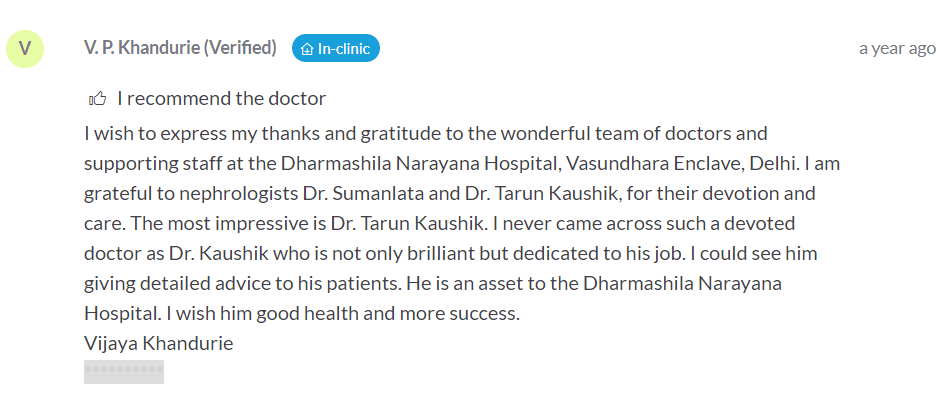
Dr. Tarun Kaushik
MBBS, MRCP UK, MRCP - Nephrology, CCT - Nephrology
Nephrologist, Delhi NCR
ADDITIONAL DIRECTOR NEPHROLOGY
Fortis Hospital
About
Dr. Tarun Kaushik
Dr. Kaushik has completed his higher medical training in the United Kingdom. He completed his post-graduation (MRCP) in Internal medicine in 2008. Subsequently, he started his career in the field of Nephrology and Transplantation. Dr. Kaushik has trained in nephrology under University College, London partner institutes. For a majority of his career, he has worked at The Royal London Hospital, which is one of the biggest nephrology units in Europe. Dr. Kaushik is competent in managing all aspects of kidney diseases and Hypertension (High Blood pressure) in the accordance of latest evidence-based medicine. He has attained extensive experience in kidney transplantation including complex high-risk renal transplantation and ABO incompatible transplantation. He is also experienced in looking after patients on maintenance haemodialysis while being constantly aware of challenges faced by chronic kidney disease patients in everyday life. Dr. Kaushik also has a special interest in providing peritoneal dialysis, particularly in patients with advanced heart failure.
Personal Statement
I want all my patients to be informed and knowledgeable about their health care, from treatment plans and services, to insurance coverage.
Info
Speciality
Nephrologist, Renal Specialist
Education
MBBS - Manipal University, Manipal, India - 2004
MRCP UK - Royal College of Physicians, UK - 2008
MRCP - Nephrology - Royal College Physicians, UK - 2014
CCT - Nephrology - Royal College of Physicians UK & General Medical Council - 2018
Past Experience
Nephrologist &Transplant physician at The Royal London Hospital, Whitechapel road, London E11BB.
Nephrologist & Transplant Physician at Basildon University Hospital
Nephrologist at Wexham Park Hospital
Nephrologist at Hull Royal Infirmary
Internal medicine at Withybush General Hospital
Internal medicine at University Hospital Aintree
Internal Medicine at Princess Alexandra Hospital
Senior Consultant, Nephrology & Kidney Transplant at Dharamshila Narayana Superspecialty Hospital
Professional Memberships
European Renal Association (ERA)
Acute Pyelonephritis - How To Detect It?

The kidneys are the main part of the urinary system, which also includes the bladder, the ureter, and the urethra. Infections reach the urinary system either through the urethra or from the bloodstream when there is an infection elsewhere. Most infections are limited to the bladder and the ureter but when an infection reaches a kidney, it can be a lot more dangerous and require immediate attention.
Pyelonephritis is more commonly known as UTI or urinary infection.
Causes: This can be an acute or a chronic condition.
- Acute condition more often happens subsequent to a bladder infection, which is not completely cured
- Chronic condition develops due to recurrent infections, kidney stones, kidney failure, and impaired renal flow
- People who have impaired immunity, poorly controlled diabetes, and higher blood pressure levels are at risk
- Women and pregnancy in particular increases the risk, as the urethra in women is shorter and puts them at greater risk of developing the infection
Symptoms:
Similar to any infection, pyelonephritis also includes general symptoms like:
- High fever with shaking chills
- Abdominal fullness
- General lethargy and fatigue
- Vomiting and diarrhea
- Warm skin with profuse sweating
- Severe cases can present with confusion
More specific symptoms include:
- Abdominal/flank pain on either side
- Bloody or cloudy urine that can be foul-smelling
- Increased frequency and urgency
- Feeling of incomplete emptying
- Painful urination
Testing/Diagnosis:
- Clinical exam can present with tenderness in the flank region
- Blood culture can reveal infection
- Urinalysis reveals impaired urine function including high levels of protein and blood
- CT scan of the abdomen area may reveal swollen kidneys
- Kidney biopsy, scan, and ultrasound may be very rarely required
Treatment:
- This is an acute condition, and when the elderly/pregnant are affected, immediate treatment is required
- Antibiotics are required to control the infection. The blood culture can guide to the most effective antibiotic.
- Pain relief requires the use of pain killers
- Acute cases may require admission to the hospital, with additional hydration support
- If the patient is not able to retain oral medications, they may be given as injections (antiobiotics and pain killers)
- Chronic cases may require longer use of antibiotics. Also, given the risk factors, recurrent infections need to be constantly
- Potential complications include kidney failure, recurrent infections, and chronic sepsis which can result in infection in the other organs
Prevention:
- Hygienic toilet habits, particularly when using public restrooms
- Hygienic sexual habits, to prevent entry of bacteria into the urinary tract
- Adequate hydration to ensure wastes and bacteria are eliminated
- Immediate treatment if you are prone for recurrent urinary infections




